

Today's working adults face complex situations of having to manage their own offspring and to play filial roles to their aging parents. Not forgetting balancing their schedules between work and associated responsibilities. Common Causes of Stress & Their Effect on Your Health.
The kids won't stop screaming, your boss has been hounding you because you turned a report in late, and you owe the IRS thousands of dollars you don't have.
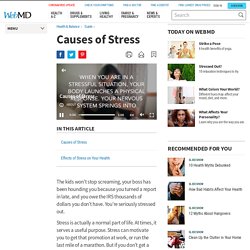
You're seriously stressed out. Stress is actually a normal part of life. At times, it serves a useful purpose. Stress: Why does it happen and how can we manage it? Stress is a natural feeling of not being able to cope with specific demands and events.
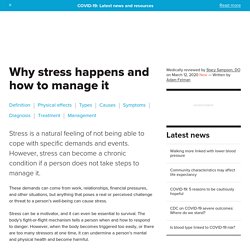
However, stress can become a chronic condition if a person does not take steps to manage it. These demands can come from work, relationships, financial pressures, and other situations, but anything that poses a real or perceived challenge or threat to a person’s well-being can cause stress. Stress can be a motivator, and it can even be essential to survival. The body’s fight-or-flight mechanism tells a person when and how to respond to danger. However, when the body becomes triggered too easily, or there are too many stressors at one time, it can undermine a person’s mental and physical health and become harmful. Stress is the body’s natural defense against predators and danger. When humans face a challenge or threat, they have a partly physical response. The body produces larger quantities of the chemicals cortisol, epinephrine, and norepinephrine.
The Main Causes of Stress. Stress is normal and, to some extent, a necessary part of life.
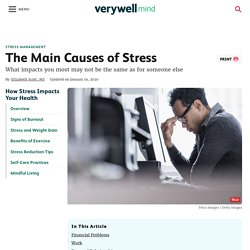
Despite it being something everyone experiences, what causes stress can differ from person to person. For instance, one person may become angry and overwhelmed by a serious traffic jam, while another might turn up their music and consider it a mild inconvenience. A fight with a friend might follow one person around for the rest of the day, while another might easily shrug it off. What's causing you stress may already be something you're abundantly aware of.
But given the importance of keeping stress in check when it comes to mitigating the effects it can have on your physical and mental health, it's worth opening yourself up to the possibility that other factors may be at play, too. Financial Problems According to the American Psychological Association (APA), money is the top cause of stress in the United States. All About Acute Stress. There are several different types of stress, and not all of them are necessarily unhealthy.

Acute stress is one of the least damaging types of stress, which is good because it is also the most common type. We experience acute stress multiple times throughout the day. Acute stress is experienced as an immediate perceived threat, either physical, emotional or psychological. These threats don't need to be intensely threatening—they can be mild stressors like an alarm clock going off, a new assignment at work, or even a phone call that needs to be answered when you're relaxing on the couch and your phone is across the room. Acute stress can also be more serious, like being pulled over for speeding, getting into an argument with a friend, or taking a test. Blood is shunted from the extremities to the big muscles, preparing the body to fight or run away. Chronic Stress Leading to Cholesterol. Studies are showing that a combination of chronic stress and high cholesterol could lead to heart disease if not quickly addressed.

For years, doctors have lectured that cutting stress has a positive impact on overall health. Now, growing research is proving that they are correct. 40 Healthy Coping Skills That Will Help You Feel Better. Whether you’ve been dumped by your date or you’ve had a rough day at the office, having healthy coping skills can be key to getting through tough times.
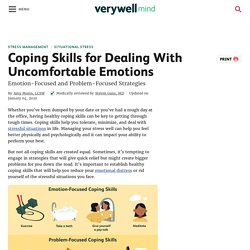
Coping skills help you tolerate, minimize, and deal with stressful situations in life. Managing your stress well can help you feel better physically and psychologically and it can impact your ability to perform your best. But not all coping skills are created equal. Sometimes, it’s tempting to engage in strategies that will give quick relief but might create bigger problems for you down the road. It’s important to establish healthy coping skills that will help you reduce your emotional distress or rid yourself of the stressful situations you face. Problem-Based Coping vs. 9 Simple Ways to Deal With Stress at Work. According to research, the percentage of Americans who are stressed at work is high, and it’s only getting higher.
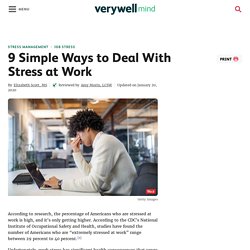
According to the CDC’s National Institute of Occupational Safety and Health, studies have found the number of Americans who are “extremely stressed at work” range between 29 percent to 40 percent.1 Unfortunately, work stress has significant health consequences that range from the relatively benign—more colds and flu—to the more serious, like heart disease and metabolic syndrome.2 But, because stress at work is so common, finding a low-stress job may be difficult or impossible for many people. Stress Management: 13 Ways to Prevent & Relieve Stress.
An Overview of Problem-Solving Therapy. Problem-solving therapy is a form of therapy that involves providing patients with tools to identify and solve problems that arise from life stressors, both big and small, to improve overall quality of life and reduce the negative impact of psychological and physical illness.

History of Problem-Solving Therapy Problem-solving therapy was first developed in Great Britain in the primary care context. It was designed to be an evidence-based treatment that doctors could use in their practices with their patients. Types of Problems Treated. 5 Emotion-Focused Coping Techniques for Stress Relief. Stress management techniques can fall into two categories: problem-focused coping and emotion-focused coping.
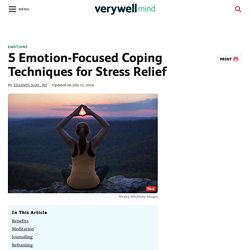
Basically speaking, problem-focused (or solution-focused) coping strategies aim to eliminate sources of stress or work with the stressors themselves, while emotion-focused coping techniques aid you in becoming less emotionally reactive to the stressors you face, or altering the way you experience these situations so they impact you differently. Many people think mainly of solution-focused coping strategies as the best way to manage stress, as cutting out the things that seem to cause us stress means we don't need to learn how to alter our responses to any stressors—there will be none left in our lives! However, it's not entirely possible to cut all stress out of our lives—some factors in our jobs, our relationships, or our lifestyles are simply prone to creating challenges. Benefits The following techniques work well for the stress of all types. Meditation Journaling Reframing. 5 Ways to Cope With Emotional Stress.